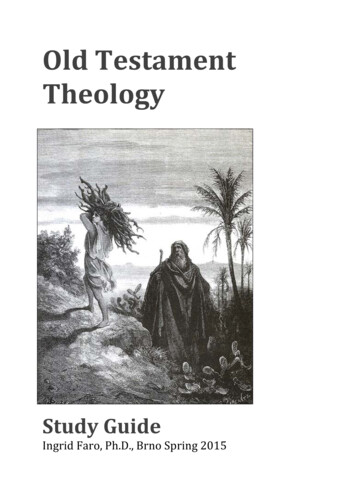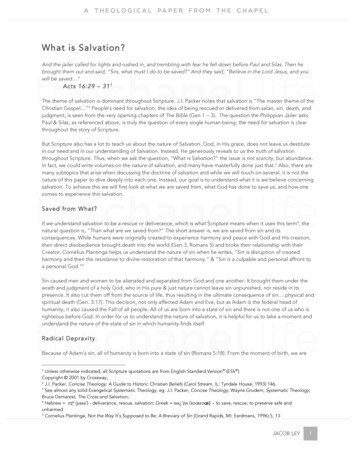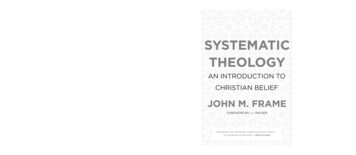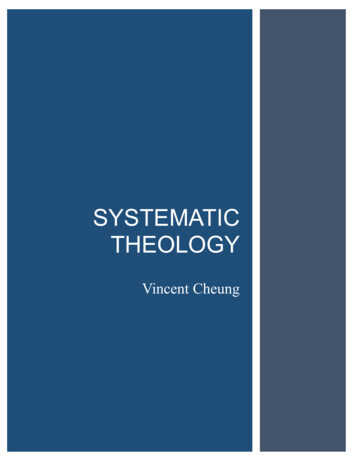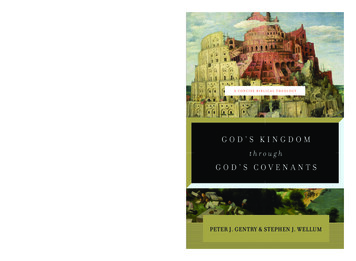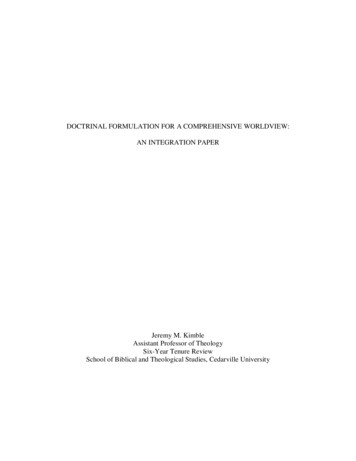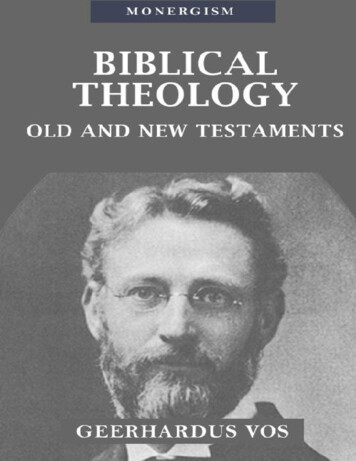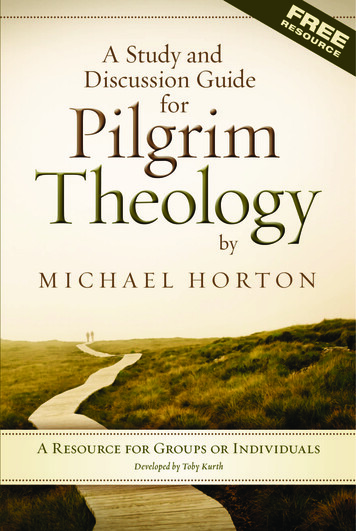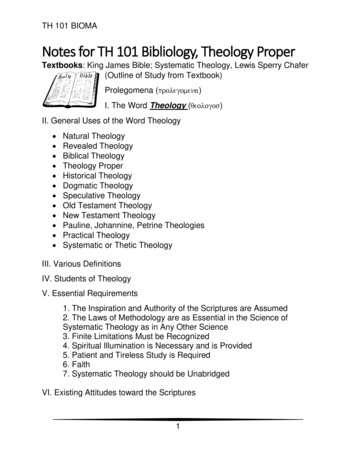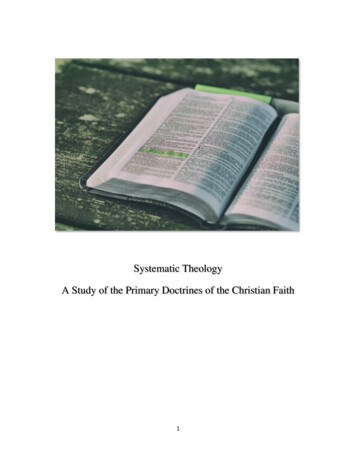
Transcription
Systematic TheologyA Study of the Primary Doctrines of the Christian Faith1
taught by Dr. Garrett Starr at Faith Baptist Church, Kaiserslautern, Germany2
Table of Contents1. Prolegomena & the Doctrine of the Word of God (Bibliology - Pt. 1) .42. The Doctrine of the Word of God (Bibliology - Pt. 2) . .103. The Doctrine of God (Theology) . 164. The Doctrine of Christ (Christology) 295. The Doctrine of the Holy Spirit (Pneumatology) .376. The Doctrine of the Trinity .467. The Doctrine of Man (Anthropology) .528. The Doctrine of Sin (Hamartiology) .589. The Doctrine of Salvation (Soteriology) .6810. The Doctrine of the Church (Ecclesiology) .74This material is summarized from Wayne Grudem’s Systematic Theology. Zondervan. Grand Rapids. 1994. 1290pp. 46.00.3
4
Faith Baptist Church“Systematic Theology: A Study of the Primary Doctrines of the Christian Faith”Lesson 1I. Prolegomena ( )A. Definition: is the study of what the entire Bible saysabout a given topic such as the nature of God, man, sin, redemption, the atonement,justification, etc. Other areas of theological study are related to Systematic Theologybut are different in their scope. For example:1. asks what Deuteronomy teaches aboutsin, or what the book of Psalms teaches concerning sin, or what the entire OldTestament teaches about sin.2. asks what the Gospel of John teachesabout prayer, or what the entire New Testament teaches about prayer.3. asks what specific sections of Scripture orcertain biblical authors teach on a given topic, and how that topic developedhistorically in Scripture. For example, what does 1 John say about the obedience ofa true Christian, or what does the Apostle Paul say about the role of women in thechurch? This sounds very close to Systematic Theology, and indeed thesedisciplines overlap, but Biblical Theology is concerned with the historicaldevelopment of a doctrine in Scripture.The difference then between Systematic Theology and these other areas of theological study is thatSystematic Theology focuses on all the relevant biblical passages on a given doctrine to arrive at aproper understanding of what the whole of Scripture teaches on a particular subject. Therefore,Systematic Theology asks what does the entire Bible teach us about prayer, about sin, aboutsalvation, etc.?B. Why is it important to study Systematic Theology?All our study of theology must help us arrive at a right understanding of Who God is, how we areto live in relationship with Him, and how we are to live out this relationship in everyday life. If allof our efforts do not bring us to this place of knowing truth and right living before the Lord, thenwhy bother?Systematic Theology, then, is the study of God’s timeless truth that should transform the way welive our daily lives for His glory. Therefore, we study Systematic Theology to:5
1. .2. correctly articulate the doctrines of orthodox Protestant Christianity.3. .4. correct any false assumptions or heretical positions that we may currently hold.5. .C. What are the doctrines that we will examine in our study of Systematic Theology?1. The Doctrine of (Bibliology – Parts 1 & 2)2. The Doctrine of (Theology)3. The Doctrine of (Christology)4. The Doctrine of (Pneumatology)5. The Doctrine of the Trinity6. The Doctrine of (Anthropology)7. The Doctrine of (Hamartiology)8. The Doctrine of (Soteriology)9. The Doctrine of (Ecclesiology)D. Finally, as we begin our study of Systematic Theology, we will do so with twoassumptions, or presuppositions:1. The Bible is true and is our only absolute standard of truth.2. The God of Whom the Bible speaks does exist and is absolutely Who the Bibledeclares Him to be, specifically, the Creator of all things that exist.Important Terms from this Section:6
ProlegomenaOrthodoxOld Testament TheologySystematic TheologyNew Testament TheologyBiblical TheologyII. The Doctrine of the Word of God ( )A. Definition: “The Word of God” is a phrase used in Scripture to denote several differentmeanings. It is important for us to distinguish between these biblical uses as we begin ourstudy of this doctrine.1. The Word of God asa. The Apostle John sees the risen Lord Jesus in Heaven and says, “He is clothed witha robe dipped in blood, and His name is called The Word of God.” Revelation19:13, NASB.b. Similarly, the opening of John’s Gospel we read, “In the beginning was the Word,and the Word was with God, and the Word was God.” John 1:1, NASB. It is clearthat John is speaking of Jesus Christ because in John 1:14 the apostle states, “Andthe Word became flesh and dwelt among us, full of grace and truth.”c. While this usage of calling Jesus “the Word” is not common in Scripture, it doesindicate that among the members of the Trinity, it is God the Son Who in His Personand His Word has the role of communicating the character of God to man.2. The Word of God asa. Examples of God speaking directly to people on earth are found in Scripture.b. God’s instruction to Adam demonstrates this personal address:“The LORD God commanded the man, saying, ‘From any tree of the garden youmay eat freely; but from the tree of the knowledge of good and evil you shall noteat, for in the day that you eat from it you will surely die.’" Genesis 2:16-17c. At the baptism of Jesus by John the Baptist in the Jordan River, God spoke fromHeaven:7
“And behold, a voice out of the heavens said, ‘This is My beloved Son, in whom Iam well-pleased.’" Matthew 3:173. The Word of God asa. Frequently in Scripture, God raises up prophets through whom He speaks.Although these are human words, spoken by people in their familiar languages, theabsolute authority of these words, and their truthfulness, is in no way diminished.Their words are God’s Words.b. Moses speaking as God’s prophet is a perfect example of God speaking throughhuman lips.“I will raise up a prophet from among their countrymen like you, and I will put Mywords in his mouth, and he shall speak to them all that I command him. It shallcome about that whoever will not listen to My words which he shall speak in Myname, I Myself will require it of him. But the prophet who speaks a wordpresumptuously in My name which I have not commanded him to speak, or whichhe speaks in the name of other gods, that prophet shall die.” Deuteronomy 18:1820c. God made a similar statement to the prophet Jeremiah.“Then the LORD stretched out His hand and touched my mouth, and the LORDsaid to me, "Behold, I have put My words in your mouth.” Jeremiah 1:9d. Thus, God’s words spoken through human lips were to be considered just asauthoritative as if it were given through personal address.4. The Word of God asa. In addition to these other forms of God’s Word, we also find in Scripture severalinstances in which God’s Words were put in written form.b. We find an example of this in the giving of the ten commandments to Moses:“When He had finished speaking with him upon Mount Sinai, He gave Moses thetwo tablets of the testimony, tablets of stone, written by the finger of God.” Exodus31:188
c. Moses was also used later by God to write His holy law:“It came about, when Moses finished writing the words of this law in a book untilthey were complete, that Moses commanded the Levites who carried the ark of thecovenant of the LORD, saying, ‘Take this book of the law and place it beside theark of the covenant of the LORD your God, that it may remain there as a witnessagainst you.’” Deuteronomy 31:24-26d. It should be noted that these words are still considered to be God’s Word eventhough they were written down mostly by men and in normal, human language.They are authoritative and absolutely true. To disobey these words is to disobeyGod Himself.5. The Word of God asa. Our study will focus upon the Bible because it is the only form of God’s Word thatis available to us for consistent examination.b. The other forms of God’s Word are not suitable for us to study because . . .1. We cannot hear God’s words of decree and thus cannot study them directly.2. We cannot speak with the Word made flesh in His bodily form because He,Jesus, has ascended to Heaven.3. God’s words of personal address are uncommon even in Scripture.4. God’s words spoken through human lips ceased to be given when the NewTestament canon was completed so this form is also insufficient as a directionfor study.c. Therefore, only is sufficient and profitable to withstand suchrigorous, systematic, and academic scrutiny.“How blessed is the man who does not walk in the counsel of the wicked, Nor standin the path of sinners, Nor sit in the seat of scoffers! But his delight is in the law ofthe LORD, And in His law he meditates day and night.” Psalm 1:1-2"This book of the law shall not depart from your mouth, but you shall meditate onit day and night, so that you may be careful to do according to all that is written init; for then you will make your way prosperous, and then you will have success.”Joshua 1:8“All Scripture is inspired by God and profitable for teaching, for reproof, forcorrection, for training in righteousness;” 2 Timothy 3:169
“For the word of God is living and active and sharper than any two-edged sword,and piercing as far as the division of soul and spirit, of both joints and marrow, andable to judge the thoughts and intentions of the heart.” Hebrews 4:12Important Terms from this Section:BibliologyWritten RecordPersonal AddressWord of GodDecreeII. Theories of InspirationA. Definition: means that the Holy Spirit influenced the writersof Scripture in such a way that rendered their writings an accurate record of the revelationof God as He intended.1. The Theory – makes inspiration largely a high degree of insightby the writers of Scripture. Thus, the inspiration of Scripture is almost like an artisticability possessed by the writer. This view is largely held by left-wing liberalism.2. The Theory – maintains that there is an influence ofthe Holy Spirit upon the writers of Scripture but involves only a heightening of theirnormal ability. There is no special revelation of truth or guidance in what is written,but rather an increased sensitivity to discover truth.3. The Theory – emphasizes a combination of divine and human influencesupon the process of inspiration and the writing of the Bible. The Spirit of God worksby directing the writer to the thoughts or concepts and allowing the writer’s owndistinctive personality to come into play in the choice of words and expressions.4. The Theory – insists that the Holy Spirit’s influence extendsbeyond the direction of thoughts to the selection of words used to convey the message.The work of the Holy Spirit is so intense that each word is the exact word that Godwanted used at that point to express the message while still allowing the distinctivesof the individual writers to come through in the Scripture. This is the view we hold.5. The Theory – teaches that God actually dictated the Bible to thewriters with no regard to the writers’ individual style or personality.10
Faith Baptist Church“Systematic Theology: A Study of the Primary Doctrines of the Christian Faith”Lesson 2I. The Doctrine of the Word of God ( )A. Definition: The of Scripture – The word “canon” means “measuringrod.” In this context then the biblical canon is the complete list of books that belongin the Bible.1. We must not underestimate the importance of this doctrine. The Words of Scriptureare the Words that nourish our spiritual lives. Therefore, we can echo the words ofMoses to the nation of Israel in reference to the Words of God’s law:“For it is no trifle for you, but it is your life, and thereby you shall live long in theland which you are going over the Jordan to possess” Deuteronomy 32:47.2. To from the Word of God would either preventGod’s people from fully obeying Him, or would require of God’s people that whichGod has not commanded. Therefore, the precise determination of the extent of thecanon is of the utmost importance.“You shall not add to the word which I command you, nor take from it; that youmay keep the commandments of the Lord your God which I command you”Deuteronomy 4:2.II. The CanonA. The earliest collection of words from God is .“When He had finished speaking with him upon Mount Sinai, He gave Moses thetwo tablets of the testimony, tablets of stone, written by the finger of God.” Exodus31:18“Then Moses turned and went down from the mountain with the two tablets of thetestimony in his hand, tablets which were written on both sides; they were written onone side and the other.” Exodus 32:15B. Other Old Testament prophets also added to the canon as instructed by God.1.11
“And Joshua wrote these words in the book of the law of God . . .” Joshua 24:262.“Then Samuel told the people the ordinances of the kingdom, and wrote them inthe book and placed it before the LORD . . .” 1 Samuel 10:253.“Now the rest of the acts of Jehoshaphat, first to last, behold, they arewritten in the annals of Jehu the son of Hanani, which is recorded in the Book ofthe Kings of Israel.” 2 Chronicles 20:344."Thus says the LORD, the God of Israel, 'Write all the words which Ihave spoken to you in a book.’” Jeremiah 30:2Many more Old Testament prophets were used by God to write His words to Hispeople, and this list is by no means exhaustive.C. The of the Old Testament Canon1. The Old Testament canon continued to grow as God spoke through His prophets.If we date Haggai to 520 B.C., Zechariah to 518 B.C., and Malachi around 435B.C., we know that this period coincided with the last books of the Old Testament:Ezra, Nehemiah, and Ester.2. Jesus and the New Testament authors quote the Old Testament Scriptures asdivinely authoritative times, but not once do they cite any statementfrom the Apocrypha, or any other writings, as having divine authority. Thus, theNew Testament writers agreed that the Old Testament canon, no more and no less,was to be taken as God’s very words.D. What the Old Testament Canon1. The books that comprise the Apocrypha, a collection of Jewish historical books,have never been considered Scripture by the Jews.The Roman Catholic Church includes the Apocrypha in its Bible. TheApocrypha includes these non-canonical books: 1 and 2 Esdras, Tobit, Judith,The Rest of Esther, the Wisdom of Solomon, Ecclesiasticus, Baruch (includingthe Epistle of Jeremiah), the Song of the Three Holy Children, Susanna, Bel andthe Dragon, the Prayer of Manasseh, and 1 and 2 Maccabees.12
2. These books were not included in Hebrew Scripture, but were included in theSeptuagint, the Greek translation of the Old Testament.3. The Latin Vulgate translation of the Bible by Jerome included the Apocrypha, butJerome himself stated that these books were not “books of the canon,” but merely“books of the church” that provided historical background on the Jewish people.4. At the in 1546 the Roman Catholic Churchofficially adopted the Apocrypha as part of its Bible. These books include teachingon prayers for the dead, and justification by faith plus works rather than by faithalone, and other teaching that contradicts Scripture. In so doing, the RCC upholdsthat the tradition of the church has the same authority as the Bible. This teachingwas prevalent in the church until the Reformation.III. The CanonA. The New Testament is comprised of the writings of the Christ’s Apostles as they weremoved by ."But the Helper, the Holy Spirit, whom the Father will send in My name, He will teach youall things, and bring to your remembrance all that I said to you.” John 14:26"But when He, the Spirit of truth, comes, He will guide you into all the truth; for He willnot speak on His own initiative, but whatever He hears, He will speak; and He willdisclose to you what is to come. He will glorify Me, for He will take of Mine and willdisclose it to you.” John 16:13-14B. Those who held the office of Apostle in the early church claimed equality with the OldTestament prophets. This authority allowed them to speak and write the very words ofGod.1. Peter encourages his readers to remember “the words spoken beforehand by the holyprophets and the commandment of the Lord and Savior spoken by your apostles.” 2Peter 3:22. To lie to the Apostles was equivalent to lying to the Holy Spirit and to God.“But a man named Ananias, with his wife Sapphira, sold a piece of property, and keptback some of the price for himself, with his wife's full knowledge, and bringing aportion of it, he laid it at the apostles' feet. But Peter said, ‘Ananias, why has Satanfilled your heart to lie to the Holy Spirit and to keep back some of the price of the land?While it remained unsold, did it not remain your own? And after it was sold, was it not13
under your control? Why is it that you have conceived this deed in your heart? Youhave not lied to men but to God.’" Acts 5:1-4C. The New Testament itself affirms that it is .1. The Apostle Peter clearly affirms that Paul’s epistles are Scripture.“. . . just as also our beloved brother Paul, according to the wisdom given him, wrote toyou, as also in all his letters, speaking in them of these things, in which are some thingshard to understand, which the untaught and unstable distort, as they do also the rest ofthe Scriptures, to their own destruction.” 2 Peter 3:15-16The word translated “Scripture” here is the Greek word graphe, a word that is usedfifty-one times in the New Testament and that refers to the Old Testament Scriptures inevery single instance. Thus, the word used equates Old Testament writings and thewritings of Paul as Scripture.2. Paul also connects the New Testament and the Old Testament as Scripture.“The elders who rule well are to be considered worthy of double honor, especially thosewho work hard at preaching and teaching. For the Scripture says, "YOU SHALL NOTMUZZLE THE OX WHILE HE IS THRESHING," and "The laborer is worthy of hiswages."1 Timothy 5:17-18The first reference Paul uses from Scripture is from Deuteronomy 25:4 while the secondis from Luke 10:7. Thus, Paul is quoting Luke’s Gospel and recognizing it as Scripture.D. The Five Characteristics of Scripture1. The of Scripture – By this we mean that all the words inScripture are God’s words in such a way that to disbelieve or disobey any word ofScripture is to disbelieve or disobey God.a. “All Scripture is inspired by God . . .” 2 Timothy 3:16b. “For no prophecy was ever made by an act of human will, but men moved by theHoly Spirit spoke from God.” 2 Peter 1:21c. “Now all this took place to fulfill what was spoken by the Lord through theprophet” Matthew 1:22d. “If anyone thinks he is a prophet or spiritual, let him recognize that the thingswhich I write to you are the Lord's commandment.” 1 Corinthians 14:37e. These verses, and many others, attribute the source of the Scriptures to God. Hespoke His very words through human agents who spoke and wrote God’s words14
down as God intended us to receive them. Therefore, the Scripture is absolutelyauthoritative as God’s words to us collected as God purposed in the closed canonof Scripture.2. The of Scripture – By this we mean that Scripture in theoriginal manuscripts does not affirm anything that is contrary to fact.a. This definition does not mean that the Bible tells us every fact there is to knowabout any one subject, but it affirms that what the Bible does say about any subjectis true.b. “Every word of God is tested; He is a shield to those who take refuge in Him.”Proverbs 30:5c. Though sin may taint the words of every man who speaks, God may speak throughthe agency of men without any error whatsoever because He is God.d. "God is not a man, that He should lie, Nor a son of man, that He should repent;”Numbers 23:19e. The Bible can be inerrant and still speak in the ordinary language of everydayspeech.3. The of Scripture – By this we mean that the Holy Spirit wrotethe Old and New Testaments through men in such a way that they may be understoodby ordinary believers. Everything needed for our salvation and our Christian life andgrowth are very clearly set forth in Scripture.a. Anyone who studies the Bible must admit that some parts of it are easy tounderstand while other parts seem puzzling. Faithful study brings clarity.b. “. . . just as also our beloved brother Paul, according to the wisdom given him,wrote to you, as also in all his letters, speaking in them of these things, in whichare some things hard to understand, which the untaught and unstable distort, asthey do also the rest of the Scriptures, to their own destruction.” 2 Peter 3:15-16c. The primary reason for misunderstanding Scripture is poor hermeneutical method.Without proper study technique (Observation, Interpretation, and Application), itis impossible to rightly interpret the Word of God.4. The of Scripture – By this we mean that the Bible is necessaryfor knowing the Gospel, for maintaining spiritual life, and for knowing God’s will.15
a. "The secret things belong to the LORD our God, but the things revealed belong tous and to our sons forever, that we may observe all the words of this law.”Deuteronomy 29:29b. “How blessed are those whose way is blameless, Who walk in the law of theLORD.” Psalm 119:1c. Scripture is not necessary to know that God exists, nor to know something of God’scharacter or moral laws.d. “For since the creation of the world His invisible attributes, His eternal power anddivine nature, have been clearly seen, being understood through what has beenmade, so that they are without excuse.” Romans 1:205. The of Scripture – By this we mean that Scripturecontains all the words of God intended His people to have at each stage of redemptivehistory, and that it now contains all the words of God we need for salvation, for trustingHim perfectly, and for obeying Him perfectly.a. This definition means that God considers His Word to be enough for us to live inholy obedience before Him.b. “and that from childhood you have known the sacred writings which are able togive you the wisdom that leads to salvation through faith which is in Christ Jesus.All Scripture is inspired by God and profitable for teaching, for reproof, forcorrection, for training in righteousness; so that the man of God may be adequate,equipped for every good work.” 2 Timothy 3:15-17c. The sufficiency of Scripture should:1. us to search out God’s Word to know what He saysabout every doctrine and area of life.2. us that we are to add nothing to nor take away fromScripture, and that no other writing is of equal value to the Word of God.3. to us that God does not require us to believeanything about Himself or His redemptive work that is not found in Scripture.4. to us that no modern revelations from God are tobe placed on the same level as the authority of Scripture.5. us that our doctrinal and ethical teaching shouldemphasize what Scripture emphasizes and teaches.16
Faith Baptist Church“Systematic Theology: A Study of the Primary Doctrines of the Christian Faith”Lesson 3I.The Doctrine of God ( )A. The of God: How do we know that God exists?1. Humanity’s of God – All people have an inner sensethat God exists, that they are His creatures, and that He is their Creator. Of thewicked, Scripture has this to say about their rejection of this truth:18For the wrath of God is revealed from heaven against all ungodliness andunrighteousness of men, who suppress the truth in unrighteousness,19 becausethat which is known about God is evident within them; for God made it evidentto them. (Rom 1:18-19 NAS)The denial of God’s existence is the willful act of a fool.“The fool has said in his heart, ‘There is no God.’ They are corrupt, they havecommitted abominable deeds; There is no one who does good. (Psa 14:1; 53:1NAS)For the Christian, this inner sense of God takes on a clear and distinctunderstanding. Christians begin to see God as their heavenly Father.“For you have not received a spirit of slavery leading to fear again, but youhave received a spirit of adoption as sons by which we cry out, ‘Abba! Father!’"(Rom 8:15 NAS)The Holy Spirit bears witness with the Christian that he or she is a child of God.“The Spirit Himself bears witness with our spirit that we are children of God,”(Rom 8:16 NAS)Christians come to know that Jesus Christ is living within them.“so that Christ may dwell in your hearts through faith; and that you, beingrooted and grounded in love,” (Eph 3:17 NAS)17
“to whom God willed to make known what is the riches of the glory of thismystery among the Gentiles, which is Christ in you, the hope of glory.” (Col1:27 NAS)B. Believing the in Scripture and Nature1. Beginning with the book of Genesis, Scripture does not present the existence ofGod as something that needs to be proven. Instead, Scripture assumes that Godexists throughout the entire canon.“In the beginning God created the heavens and the earth. (Gen 1:1 NAS)Thus, at the very beginning of the written Word of God, we find not a list ofconvincing proofs that there is a God, but rather we are told what God has done.Closely connected with this biblical , Scripturealso declares that the existence of God is evident through nature.“For since the creation of the world His invisible attributes, His eternal powerand divine nature, have been clearly seen, being understood through what hasbeen made, so that they are without excuse. (Rom 1:20 NAS)“The heavens are telling of the glory of God; And their expanse is declaringthe work of His hands.” (Psa 19:1 NAS)The beauty of a snowflake, the complexity of the human eye, the navigationalabilities of a simple honey bee, and a million other evidences in nature( ) all point to the fact that God the Creator exists. Anyonedenying this truth is either wrongly evaluating the evidence or intentionallydenying the existence of God.C. Traditional for the Existence of God – The traditional “proofs”for the existence of God have been constructed by Christian (and some nonChristian) philosophers throughout history. They are attempts to analyze theevidence for the existence of God, especially from nature, in extremely careful andlogically precise ways, in order to convince people that it is not rational to rejectthe idea of God’s existence.Most of the traditional proofs for the existence of God can be classified in fourmajor types of arguments:1. The Argument considers the fact that everyknown thing in the universe has a cause. Therefore, the universe itself must alsohave a cause, and the cause of such a great universe can only be God.2. The Argument is really a subcategory of theCosmological Argument. It focuses on the evidence, harmony, order, and18
design in the universe, and argues that its design gives evidence of an intelligentpurpose (the Greek word telos means “end” or “goal” or “purpose”). Since theuniverse appears to be designed with a purpose, there must be an intelligent andpurposeful God who created it to function this way.3. The Argument begins with the idea of God, who isdefined as a being (ont is the Greek stem for “being”) “greater than whichnothing can be imagined.” It then argues that the characteristic of existencemust belong to such a Being since it is greater to exist than not to exist.4. The Argument begins from man’s sense of right andwrong, and for the need for justice to be done. It argues that there must be aGod who is the source of all that is right and good and who will one day meteout justice to all people.These four types of arguments are used to overcome to intellectual objections to theexistence of God held by unbelievers. These arguments cannot bring people tosaving faith, but they can provide intellectual evidence for something that they havealready been persuaded of from their own inner sense of God and from thetestimony of Scripture and nature.D. The of God – Can we really know God? How much ofGod can we know?1. The Necessity for God to Himself to Us – If we are to know Godat all, it is necessary for Him to make himself known to us. Even when discoveringGod in nature, it is God’s revelation of himself through nature that enables us toknow Him. This is revelation.With regard to the personal knowledge of God that comes in salvation, this idea iseven more explicit."All things have been handed over to Me by My Father; and no one knows the Son,except the Father; nor does anyone know the Father, except the Son, and anyoneto whom the Son wills to reveal Him. (Mat 11:27 NAS)Thus, only God himself can give the revelation of himself andthe saving work
Systematic Theology, then, is the study of God’s timeless truth that should transform the way we live our daily lives for His glory. Therefore, we study Systematic Theology to: 6 1. _. 2. correctly arti
